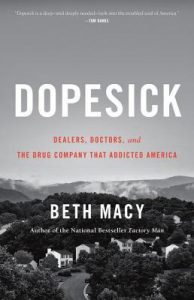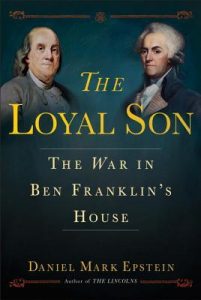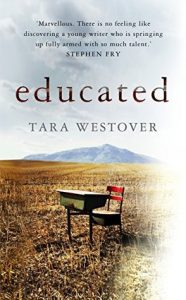Here Be No Dragons: 4 Non-Fiction Books to read in 2019
It’s that time again!
What time, you ask.
That time when I show up and spout off on books that don’t involve magic. I know, I know, you’ve been desperate for this time to come around again.
But before your attention wanders back to dragons and talking swords, just know that you’ll be missing out on a great book. I’ve read four non-fiction books so far this year and one of them was so astonishing that I’ve been recommending it left and right.
Let’s get started!
 My first non-fiction of 2019 was Dopesick by Beth Macy. If you want to be filled with righteous anger directed at greedy corporations, read this book. It tracks America’s opioid crisis from its earliest days over twenty years ago through both a broad lens and the intense focus of the stories of a few individuals and families. Macy even goes back into the history of opium in America, revealing the depth of the roots of painkiller culture. Did you know that infants were given opium in the 1800s to keep them from fussing? Did you know Bayer sold heroin to treat coughing in the late 19th and early 20th centuries? And this was common practice despite the concerns of many researchers.
My first non-fiction of 2019 was Dopesick by Beth Macy. If you want to be filled with righteous anger directed at greedy corporations, read this book. It tracks America’s opioid crisis from its earliest days over twenty years ago through both a broad lens and the intense focus of the stories of a few individuals and families. Macy even goes back into the history of opium in America, revealing the depth of the roots of painkiller culture. Did you know that infants were given opium in the 1800s to keep them from fussing? Did you know Bayer sold heroin to treat coughing in the late 19th and early 20th centuries? And this was common practice despite the concerns of many researchers.
From those origins, Macy takes the reader to and through the current addiction crisis, demonstrating how pharmaceutical companies are responsible (shady marketing, bribing doctors, etc.) and how grass roots organizations have begun to fight back. The fight has been hard and slow and exacting and it is littered with tragedy—but small gains can be seen and built on. I learned a lot reading Dopesick, and, yes, it made me angry. But I am immensely glad I read it.
Shortly after Dopesick, I delved into The Loyal Son: The War in Ben Franklin’s House by Daniel Mark Epstein, which focuses on the relationship between Benjamin Franklin and his illegitimate son, William, whom he adopted. That relationship was tested and ultimately severely damaged during the Revolutionary War period—because William chose to remain loyal to King George III. Talk about family drama! This divide in the Franklin household could never be kept secret: William, as governor of New Jersey, was the last royal governor in North America.
 Epstein pulls from letters—many only recently published—between father and son, as well as many other individuals in their orbit, and creates a narrative that gives a new perspective on the Revolutionary War. While I enjoyed the book, I found it a bit slow at times. Your experience of this book will depend heavily on your existing interest in the subject.
Epstein pulls from letters—many only recently published—between father and son, as well as many other individuals in their orbit, and creates a narrative that gives a new perspective on the Revolutionary War. While I enjoyed the book, I found it a bit slow at times. Your experience of this book will depend heavily on your existing interest in the subject.
I chose my third non-fiction read of 2019 based on the recommendation of a photographer I follow on social media. But you don’t have to be a photographer—I’m not!—to find Short Nights of the Shadow Catcher: The Epic Life and Immortal Photographs of Edward Curtis by Timothy Egan fascinating. You, like me, may have never heard of Curtis, but there’s a good chance you’ve seen one or two of his most famous photographs.
Curtis (1868-1952) began his career as a portrait photographer and quickly developed a following among the wealthy denizens of the Pacific Northwest. It wasn’t long, however, before he developed an obsession that he would pursue for three decades: immortalizing the original inhabitants of North America on film before they disappeared. He documented the people and cultures of more than 80 Native American tribes, persevering through financial difficulties (this was an enormously expensive undertaking) and the understandable mistrust of many of the tribes. He didn’t just take photographs. He filmed and made audio recordings, and his attention to linguistics has helped later generations of Native Americans revive their language traditions. Ultimately, his 20 volume project was too expensive to sell well, leaving Curtis dependent on his daughter and largely forgotten after his death. This was a fascinating story, told with good narrative flavor; I definitely recommend it.
That leaves us with the fourth book, the one I read in six hours on a day late in July. I came to this book in an unusual way. My mom had read it and mentioned it, but only in passing. I was in the middle of a two-month writing frenzy that produced a new manuscript, and as a result I wasn’t reading much. But I was craving a good book that could give me an outlet from my work. Enter Educated.
I got more than a good outlet. I got six intense hours of reading. I couldn’t look away.
 Educated is Tara Westover’s memoir about growing up in a survivalist, anti-government, extreme Mormon family in Idaho. She never went to school until her first year of college. She had a ‘head for the hills’ bag stashed under her bed for when the family would need to escape the government. She didn’t have a birth certificate until she was nine years old. She never saw a doctor. Severe injuries, including extensive, life-threatening burns, sustained by family members were treated at home. When Tara dared to take one of her brothers to the hospital after a motorcycle accident that left part of his skull exposed, she opened herself up to withering criticism from her father and silent condemnation from her mother.
Educated is Tara Westover’s memoir about growing up in a survivalist, anti-government, extreme Mormon family in Idaho. She never went to school until her first year of college. She had a ‘head for the hills’ bag stashed under her bed for when the family would need to escape the government. She didn’t have a birth certificate until she was nine years old. She never saw a doctor. Severe injuries, including extensive, life-threatening burns, sustained by family members were treated at home. When Tara dared to take one of her brothers to the hospital after a motorcycle accident that left part of his skull exposed, she opened herself up to withering criticism from her father and silent condemnation from her mother.
Somehow, Tara made it out. She went to college, she got a PhD. Along the way, she had to forge an identity other than the one assigned to her by her family—the one she had accepted without question for so long. She also has had to deal with the consequences of finding that identity. Tara, now in her early thirties, is in contact with three of her five brothers, but not her sister or her parents.
This is a story of will, the will to change one’s life. I can’t really, despite having read the book, fathom what it took for Tara to get to where she is. I can’t fathom her childhood, which occurred across just a few state lines from mine. I can’t fathom the extreme shift in worldview she had to undergo once she was no longer living in isolation. This book goes beyond superlatives for me, but I’ve settled on telling people that it is horrifying and fascinating in equal parts. Most of all, I have this to say about it: read it.
